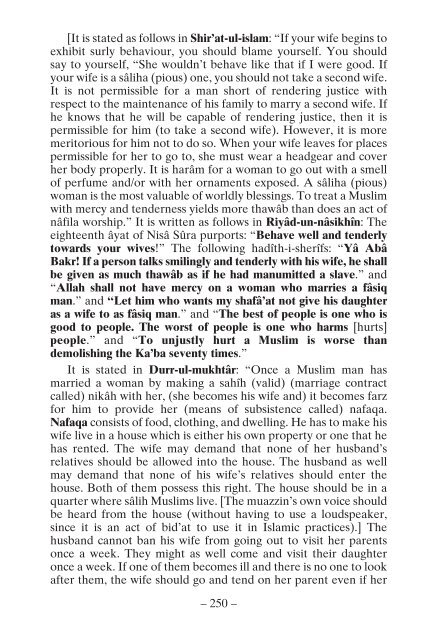Miftah-ul-Janna (Booklet for way to Paradise)
You also want an ePaper? Increase the reach of your titles
YUMPU automatically turns print PDFs into web optimized ePapers that Google loves.
[It is stated as follows in Shir’at-<strong>ul</strong>-islam: “If your wife begins <strong>to</strong><br />
exhibit surly behaviour, you sho<strong>ul</strong>d blame yourself. You sho<strong>ul</strong>d<br />
say <strong>to</strong> yourself, “She wo<strong>ul</strong>dn’t behave like that if I were good. If<br />
your wife is a sâliha (pious) one, you sho<strong>ul</strong>d not take a second wife.<br />
It is not permissible <strong>for</strong> a man short of rendering justice with<br />
respect <strong>to</strong> the maintenance of his family <strong>to</strong> marry a second wife. If<br />
he knows that he will be capable of rendering justice, then it is<br />
permissible <strong>for</strong> him (<strong>to</strong> take a second wife). However, it is more<br />
meri<strong>to</strong>rious <strong>for</strong> him not <strong>to</strong> do so. When your wife leaves <strong>for</strong> places<br />
permissible <strong>for</strong> her <strong>to</strong> go <strong>to</strong>, she must wear a headgear and cover<br />
her body properly. It is harâm <strong>for</strong> a woman <strong>to</strong> go out with a smell<br />
of perfume and/or with her ornaments exposed. A sâliha (pious)<br />
woman is the most valuable of worldly blessings. To treat a Muslim<br />
with mercy and tenderness yields more thawâb than does an act of<br />
nâfila worship.” It is written as follows in Riyâd-un-nâsikhîn: The<br />
eighteenth âyat of Nisâ Sûra purports: “Behave well and tenderly<br />
<strong>to</strong>wards your wives!” The following hadîth-i-sherîfs: “Yâ Abâ<br />
Bakr! If a person talks smilingly and tenderly with his wife, he shall<br />
be given as much thawâb as if he had manumitted a slave.” and<br />
“Allah shall not have mercy on a woman who marries a fâsiq<br />
man.” and “Let him who wants my shafâ’at not give his daughter<br />
as a wife <strong>to</strong> as fâsiq man.” and “The best of people is one who is<br />
good <strong>to</strong> people. The worst of people is one who harms [hurts]<br />
people.” and “To unjustly hurt a Muslim is worse than<br />
demolishing the Ka’ba seventy times.”<br />
It is stated in Durr-<strong>ul</strong>-mukhtâr: “Once a Muslim man has<br />
married a woman by making a sahîh (valid) (marriage contract<br />
called) nikâh with her, (she becomes his wife and) it becomes farz<br />
<strong>for</strong> him <strong>to</strong> provide her (means of subsistence called) nafaqa.<br />
Nafaqa consists of food, clothing, and dwelling. He has <strong>to</strong> make his<br />
wife live in a house which is either his own property or one that he<br />
has rented. The wife may demand that none of her husband’s<br />
relatives sho<strong>ul</strong>d be allowed in<strong>to</strong> the house. The husband as well<br />
may demand that none of his wife’s relatives sho<strong>ul</strong>d enter the<br />
house. Both of them possess this right. The house sho<strong>ul</strong>d be in a<br />
quarter where sâlih Muslims live. [The muazzin’s own voice sho<strong>ul</strong>d<br />
be heard from the house (without having <strong>to</strong> use a loudspeaker,<br />
since it is an act of bid’at <strong>to</strong> use it in Islamic practices).] The<br />
husband cannot ban his wife from going out <strong>to</strong> visit her parents<br />
once a week. They might as well come and visit their daughter<br />
once a week. If one of them becomes ill and there is no one <strong>to</strong> look<br />
after them, the wife sho<strong>ul</strong>d go and tend on her parent even if her<br />
– 250 –

















